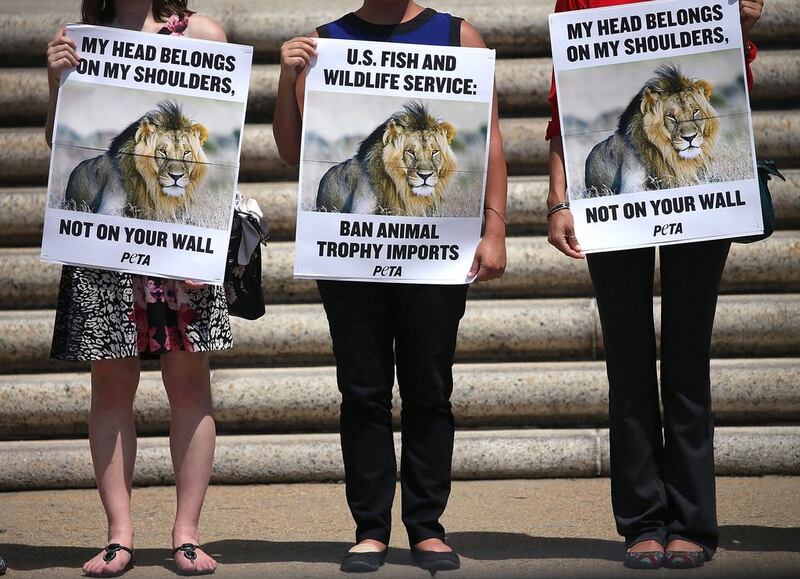The killing of Cecil the lion caused an international storm of outrage that, at least short-term, poses a risk to the lucrative African trophy hunting industry.
The incident has put the sector, and associated industries, under scrutiny as never before.
The fallout has already been significant. While Etihad Airways and Emirates had already banned carrying big-game trophies in their cargo holds, the furore over Cecil has forced others such as Delta Airlines, American Airlines and United Continental to follow this country’s lead.
Delta Air Lines, the American carrier with the largest footprint in Africa, confirmed last week that it is banning all lion, leopard, elephant, rhinoceros and buffalo trophies from its cargo holds. United and American quickly followed.
US embargoes are important because Americans make up much the largest proportion of hunters. Other carriers have also added their names to the list of those that have banned trophy carriage including: British Airways; Air Canada; Air France; Brussels Airlines; KLM, Lufthansa, Qantas, Qatar Airways, Singapore Airlines and Virgin Atlantic Airways.
For an industry accustomed to operating out of the spotlight, servicing an equally publicity-shy but very wealthy clientele, the sudden exposure has been disconcerting.
“From my dealings with the media and the community, it has become clear to me that those against the hunting of lions bred in captivity are no longer just a small if vociferous group of animal-rights activists,” says Hermann Meyeridricks, the president of the Professional Hunters’ Association of South Africa (Phasa). Mr Meyeridricks is speaking specifically of “canned hunting”, which makes use of predators bred entirely for trophy shoots. Although Cecil was a genuine wild lion, the vast majority of those hunted are not, at least not in the conventional sense. The advent of captive breeding has lifted African trophy hunting revenues to US$200m a year, according to The Economist.
It is perhaps illustrative of the importance of the hunting sector that one exception to the airline ban is South African Airways (SAA), the flag-carrier of the African country with the briskest trade in lion hunting. An estimated 1,000 captive lions are killed each year in South Africa.
Most are raised in pens where they develop few, or none, of the vital survival instincts on which their wild brethren depend.
In fact, somewhat cynically, many establishments that raise “canned” lions bill themselves as animal sanctuaries. This allows them to tap into the foreign student gap-year market, charging hundreds of dollars for young westerners to “volunteer” and spend time cleaning cages, feeding and petting lion cubs, most unaware that the cuddly creature’s head resting on their laps will someday be mounted above a hunter’s fireplace.
While canned hunting can provide a renewable resource of lions, it cannot readily provide the big-maned creatures that trophy hunters covet. Such animals are usually the older, veteran lions that take about seven years to reach full magnificence, something that would be too costly in a farmed environment.
This is why, claim conservation sources who ask not to be named, the Zimbabwean professional hunter Theo Bronkhorst allegedly led his US client Mr Palmer to the edge of a nature reserve and lured a lion from within its boundaries with meat.
Mr Palmer was apparently willing to pay $55,000 for a full-maned lion and the likeliest candidate – Cecil – was within the boundary of Hwange reserve. The animal was lured into range using a tactic called baiting, which while not unusual, is not really regarded as sporting.
Mr Bronkhorst allowing his client to shoot a 200 kilogram lion with a bow, a feat that should only be attempted by the most skilled hunters, has also been called into question. As a result, the lion was merely badly wounded and suffered 40 hours of agony before being finally cornered and dispatched with a rifle.
The potential loss of a lucrative trade following airlines’ decision to ban carrying big-game trophies has dismayed some African governments, who fear the lost revenue will hurt environmental activities.
Both South Africa and Namibia have formally objected to the moves.
“This will be the end of conservation in Namibia,” the Namibia Press Agency quoted Pohamba Shifeta, the environment and tourism minister, as saying
It is an argument that is likely to run and run.
business@thenational.ae
Follow The National's Business section on Twitter





